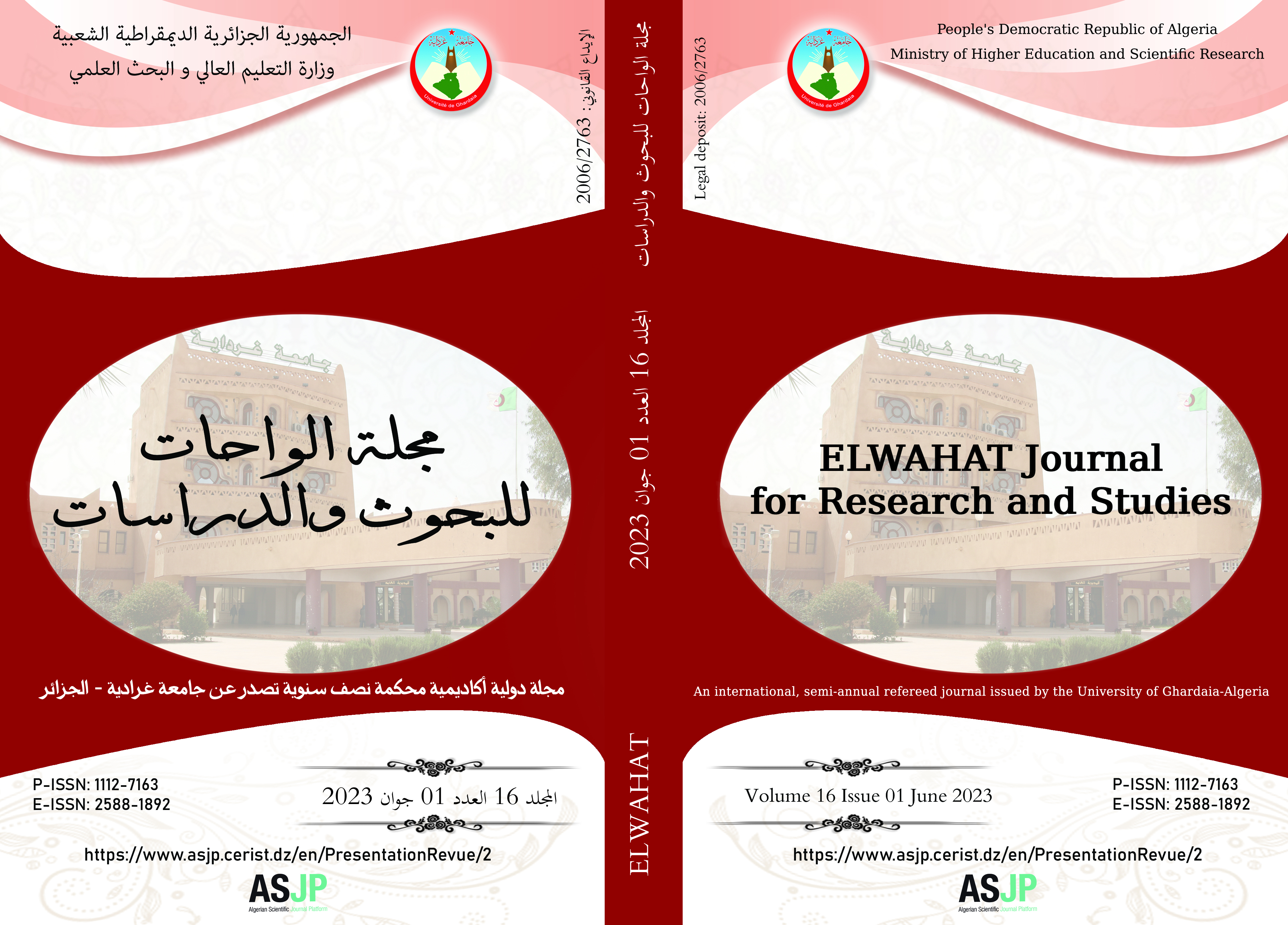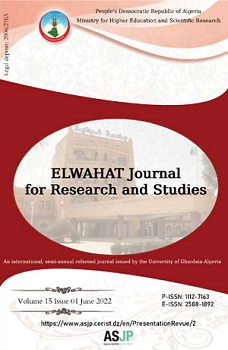The Effect Of Pupils' Motivation And Attitudes on EFL Learning in Adrar Middle Schools
DOI:
https://doi.org/10.54246/qgyne120Abstract
References:
metaphor-meaning-eeg. (2021, 02 24). Récupéré sur neurosciencenews.com/metaphor-meaning-eeg-10979/
Abrams, J., & Zweig, C. (1991). Meeting the Shadow: The Hidden Power of the Dark Side of Human Nature. Los Angeles: Jeremy P.Tarcher, INC.
Adichie, C. N. (2013). Americanah. New York: Alfred A. Knopf.
Bhabha, H. (1994). The Location of Culture. New York: Routledge.
Brone, G., & Vandaele, J. (2009). Cognitive Poetics: Goals, Gains, and Gaps. Berlin: Walter de Gruyter GmbH & Co.
Chika, U. (2012). On Black Sisters' Street. New York: Random House.
Chukwudi-Ofoedu, A. (2017). The Domination and Sexual Objectification of Women in Chika Unigwe’s On Black Sisters’ Street. Journal of Humanities and Social Policy, 1-9.
Emmot, C. (2002). “Split selves” in fiction and in medical “life stories”: Cognitive linguistic theory and narrative practice. In E. Semino, & J. Culpeper, Cognitive Stylistics: Language and Cognition in Text Analysis (pp. 153-181). Philadelphia: John Benjamins Publishing Co.
Fanon, F. (1963). The Wretched of the Earth. New York: Grove Press.
Gomez, A. B. (2015). The DIVIDED SELF metaphor: A cognitive-linguistic study of two poems by Nabokov. International Journal of English Studies, 97-113.
Grossman, B. (2017). Metaphorical Expressions of Self Awareness in English. ELR Journal, 82-105.
Lakoff, G. (1987). Women, Fire, and Dangerous Things. Chicago: The University of Chicago Press.
Lakoff, G. (1992). The Metaphorical Models of the Self Inherent in Our Conceptual System. The Conceptual Self in Context. Atlanta: UC Berkeley.
Lakoff, G. (1996). Sorry I'm not myself today: The metaphor system for conceptualizing the Self. In G. Fauconnier, & E. Sweeter, Spaces, worlds, and grammar (pp. 91-123). Chicago: University of Chicago Press.
Lakoff, G., & Johnson, M. (1999). Philosophy in the Flesh. New York: Basic Books.
Okolo, I. G. (2019). Unsettled Subjects: Sex Work in Chika Unigwe’s On Black Sisters’ Street. English Studies in Africa, 112-123.
Reinares, L. B. (2019). The Pedagogies of Sex Trafficking Postcolonial Fiction: Consent, Agency, and Neoliberalism in Chika Unigwe’s On Black Sisters’ Street. Canadian Review of Comparative Literature, 56-76.
Stockwell, P. (2002). Cognitive Poetics: an introduction. London: Routledge.
References
Ajzen, I. (1993 B.C.E.). Attitude theory and the attitude-behavior relation. [Review of Attitude theory and the attitude-behavior relation.]. In D. K. Dagmar & S. Peter (Eds.), New directions in attitude measurement. pp. 41-57 . Berlin: Walter de Gruyter.
Al Othman, F. and Shuqair, K., (2013). The Impact of Motivation on English Language Learning in the Gulf States. International Journal of Higher Education, 2(4).pp.123-130
Aldosari, H. (2014). The Entwined Effects of Attitude, Motivation and Gender on EFL Learning: A Correlation Study. Studies In Literature And Language, 8(1), pp.1-5
Alizadeh, M. (2016). The Impact of Motivation on English Language Learning. International Journal Of Research In English Education. pp.11-15
Al-Quyadi, A., (2000 ) Psycho-sociological variables in the learning of English in Yemen. Bhagalpur University.
Al-Quyadi, A., (2000 ) Psycho-sociological variables in the learning of English in Yemen. , Bhagalpur University.
Bandura, A. (1997). Self-efficacy: the exercise of control. Choice Reviews Online, 35(03), 35–182635–1826.
Bradford, A. (2007). Motivational Orientations in Under-researched FLL Contexts. RELC Journal, 38(3), pp.302–323.
Broussard, S. C. (2004). The relationship between classroom motivation and academic achievement in elementary-school-aged children. Family and Consumer Sciences Research Journal, 33(2), 106–120.
Brown, C., & Ellis, R. (1994). The Study of Second Language Acquisition. The Modern Language Journal, 80(1), 102.
Brown, H. (1993). Principles of language learning and teaching. Englewood Cliffs Prentice Hall Regents
Call, M. L. S., & Ehrman, M. E. (1997). Understanding Second Language Learning Difficulties. TESOL Quarterly, 31(2), 372.
Chalak, A. & Kassain, Z. (2010). Motivation and attitudes of Iranian undergraduate EFL students towards learning English. GEMA Online Journal of Language Studies, 10(2), 37-56.
Dörnyei Zoltán. (2003). Motivational strategies in the language classroom. Cambridge University Press
Gan, Z. (2004). Attitudes and strategies as predictors of self-directed language learning in an EFL context. International Journal of Applied Linguistics, 14(3), 389–411.
Gardner, R. C. (1985). Social Psychology and Second language learning: The role of attitudes and motivation. Arnold
Gardner, R. C., & Lambert, W. E. (1972). Attitudes and motivation in second-language learning. Newbury House.
Getie, A. S. (2020). Factors affecting the attitudes of students towards learning English as a foreign language. Cogent Education, 7(1), 1738184.
Gilakjani, P. A., Leong, L. M. & Saburi, N. B. (2012). A Study on the Role of Motivation in Foreign Language Learning and Teaching. International Journal of Modern Education and Computer Science, 4(7), 9-16.
Grabe, W. (2012). Reading in a second language: Moving from theory to practice. Cambridge University Press
Harmer, J. (2001). The practice of English language teaching. Longman.
Hawk, K., Cowley, E. T., Hill, J., & Sutherland, S. (2000). The importance of the teacher/student relationship for Maori and Pasifika students [PDF Version].
Horwitz, E. K., Horwitz, M. B. & Cope, J. A. (1986). Foreign language classroom anxiety. The Modern Language Journal, 70(2), 125-132
HR, B. (2004). Educational psychology and techniques of teaching .4th ed., p. New Delhi) [Review of Educational psychology and techniques of teaching . Kalia.
Karahan, F. (2007). Language Attitudes of Turkish Students towards the English Language and Its Use in Turkish Context. Journal of Arts and Sciences Say, 7, 73-87
Lambert, W. E. (1963). Psychological Approaches to the Study of Language. The Modern Language Journal, 47(2), 51–62.
Mahadi, T. S. T., & Jafari, S. M. (2012). Motivation, its types, and its impacts in language learning. International Journal of Business and Social Science, 3(24), 230–235
Mellit, D. and Idri, N., 2021. The Impact of EFL Algerian University Students’ Attitudes on Literary Texts Reading Motivation: The Case of Second Year English Students at Setif 2 University. Journal of Translation and Languages,18(1), Pp. p.139-160. Available at: <https://www.asjp.cerist.dz/en/article/101366> [Accessed 31 October. 18(1)2021].
Ng, C. F., & Ng, P. K. (2015). A review of intrinsic and extrinsic motivations of ESL learners. International Journal of Languages, Literature and Linguistics, 1(2), 98-105.
Nicholls, J. G. (1984). Achievement motivation: Conceptions of ability, subjective experience, task choice, and performance. Psychological Review, 91, 328–346.
Noels, K., Clément, R., & Pelletier, L. (2001). Intrinsic, extrinsic, and integrative orientations of French Canadian learners of English. The Canadian Modern Language Review, 57(3), 424-442.
Pulido, et al , (2010) A Study on the Intrinsic Motivation Factors in Second Language Learning Among Selected Freshman Students. Philippine ESL Journal, Vol.4, 3-23
Richards, J.C., & Schmidt, R. (2002). Longman Dictionary of Language Teaching and Applied Linguistics Third Edition. Longman: Pearson Education Limited.
Ryan, R. M. (1982). Control and information in the intrapersonal sphere: An extension of cognitive evaluation theory. Journal of Personality and Social Psychology, 43, 450–461
Ryan, R. M., & Deci, E. L. (2000). Intrinsic and extrinsic motivations: Classic definitions and New Directions. Contemporary Educational Psychology, 25(1), 54–67.
Thurstone, L.L., 1931. The measurement of attitudes. journal of Abnormal and Social Psychology, 26, pp.249–269.
Van Lier, L., 1996. Interaction in the language curriculum. London: Longman.
Weinburgh, M. H. (1998). Gender, ethnicity, and grade level as predictors of middle school students’ attitudes toward science.
Wenden, A. (1991). Learner strategies for learner autonomy. Prentice Hall
Zhang, H., Dai, Y. and Wang, Y., 2020. Motivation and Second Foreign Language Proficiency: The Mediating Role of Foreign Language Enjoyment. Sustainability, 12(4), p.1302.







